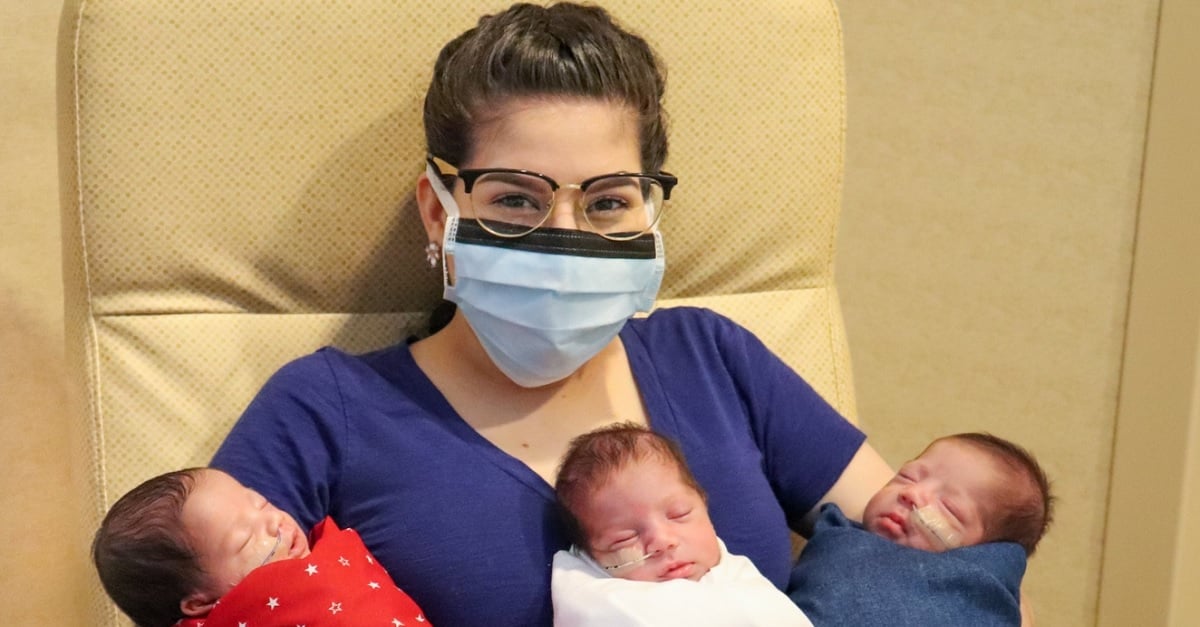
Giving birth to triplets seems like a scary situation for most women to be in. But it's even worse if you go into labor right after battling one of the scariest viruses of our time.
A woman from Texas by the name of Maggie realized she was positive for the coronavirus during a checkup on May 8. At the time, she was 28 weeks pregnant with her children. The results came through on Mother's Day, which was a big surprise.
According to the New York Post, Maggie — who already has a 5-year-old son — was worried about everyone other than herself. "As a mom, you want control, but right now, you have to accept that you don't have control of everything," she said in a Facebook post.
The hospital made sure to profile Maggie online. Even with a mask on, you can tell she's beaming.
"She worried about the health of the triplets, her husband and their 5-year-old son, as well as the nurses and physicians caring for her," the post read. "During her weeks in APU, Maggie spent a lot of time FaceTiming with her family, including her husband who was also COVID-positive, and bonding with her nurses."
Her husband's diagnosis also added to the complicated situation. But despite the challenge, Maggie was ready to fight.
She was also a wonderful patient — and made sure to express thanks to the care staff that kept her occupied. "Maggie shared that not only did her nurses learn her routine and anticipate her needs, but they would sit with her for an hour at a time, sweating under their PPE, just to keep her company," the post read. Maggie continued to be tested throughout her pregnancy. Luckily, by the time June rolled around, she received a negative test.
However, that didn't signify the end of her pregnancy struggle. "After 5 COVID tests, with the final 2 negative, Maggie learned that 'Baby A's' cord was wrapped around her neck, and she would have a C-section that day at 4 pm," the post read. "Because her husband hadn't received his 2nd negative test, she received support from her nurses and family virtually."
Based on the virus, many of us are having to connect with our loved ones digitally. For many cases, it's a nice way to show support. But when you're unexpectedly going to give birth to triplets, the situation becomes much scarier. In order to stay safe, they had no other choice.
"Maggie remembers that at exactly 3:59 pm, her father called to pray with her, and when it was time for her epidural, a nurse hugged her tightly until it was complete," the post stated. These memories will likely stick with her forever. Having an incredible hospital staff always makes a difference.
The babies were named Isabella, Adriel, and Nathaniel. Each one was born two minutes apart. "Everyone was amazed by how well Maggie did," the post exclaimed. "She and her babies, born at 32 weeks, were healthy, safe and undeniably resilient."
Maggie may have had one of the most difficult situations ever. Typically, multiples aren't expected to make it all the way to full term. According to Mother & Baby, 34 weeks is around the time most triplets make their arrival, meaning that Maggie's babies were closer to a healthy arrival date than you might think.
Hospital stays are also typically extended for triplets. "You'll probably have to stay in the hospital for longer than usual," Sandra Bosman, midwifery consultant, told Mother & Baby. "And it also means you have over a 50 per cent chance of having a caesarean. Your first baby may be born vaginally but if the others get distressed then you might need a c-section."
Right now, the triplets are still recovering in the NICU — and while Maggie wishes they were home, they're thriving and doing better than ever. "1 month later, Isabella, Nathaniel and Adriel are growing bigger and healthier by the day," the page said. "Maggie shared that while it is hard to not have the babies home, she's OK because she knows they are receiving the best possible care from a specialized team dedicated to their health."
Women who are pregnant need to be extra careful as to not get the virus. The Centers for Disease Control and Prevention believes that those who are pregnant are at a higher risk of contracting the virus and advises pregnant women to socially distance themselves. Contracting the virus may also lead to preterm birth — which might not always end favorably.
The CDC also recommends pregnant women keep up to date with their vaccine schedules and not skip out on appointments. "Receiving some vaccines during pregnancy, such as the influenza (flu) and Tdap vaccines, can help protect you and your baby," the CDC says. "If you are pregnant, you should continue to receive your recommended vaccines."
Maggie's advice for other mothers who are worried about the virus is to just take things day by day. Really, that's the best most of us can do at the moment. Testing positive is a scary thing that may lead to further complications, but as Maggie proved, each case is different.
"Maggie feels more confident than ever that everything happens for a reason," said The Woman's Hospital of Texas. "She advises other women take their pregnancy day-by-day and don't let fear of COVID-19 overpower their emotions. Maggie tells them to not be scared or ashamed if they think they have the coronavirus, and to get help whenever and however they need it."
In America, there've been over 3 million confirmed cases of the virus. And it's hitting people in different ways. It's possible to be asymptomatic and not even know you have it but accidentally infect someone who won't be able to survive it. It's something we all still need to take seriously.
But stories like Maggie's are important — because they showcase hope. Maggie is one of the many people who really beat the odds and had the strength to tell her story. For women who are about to deliver, this climate may not have been what you initially expected, but people are still working hard to try to keep you and your baby (or babies) safe.




